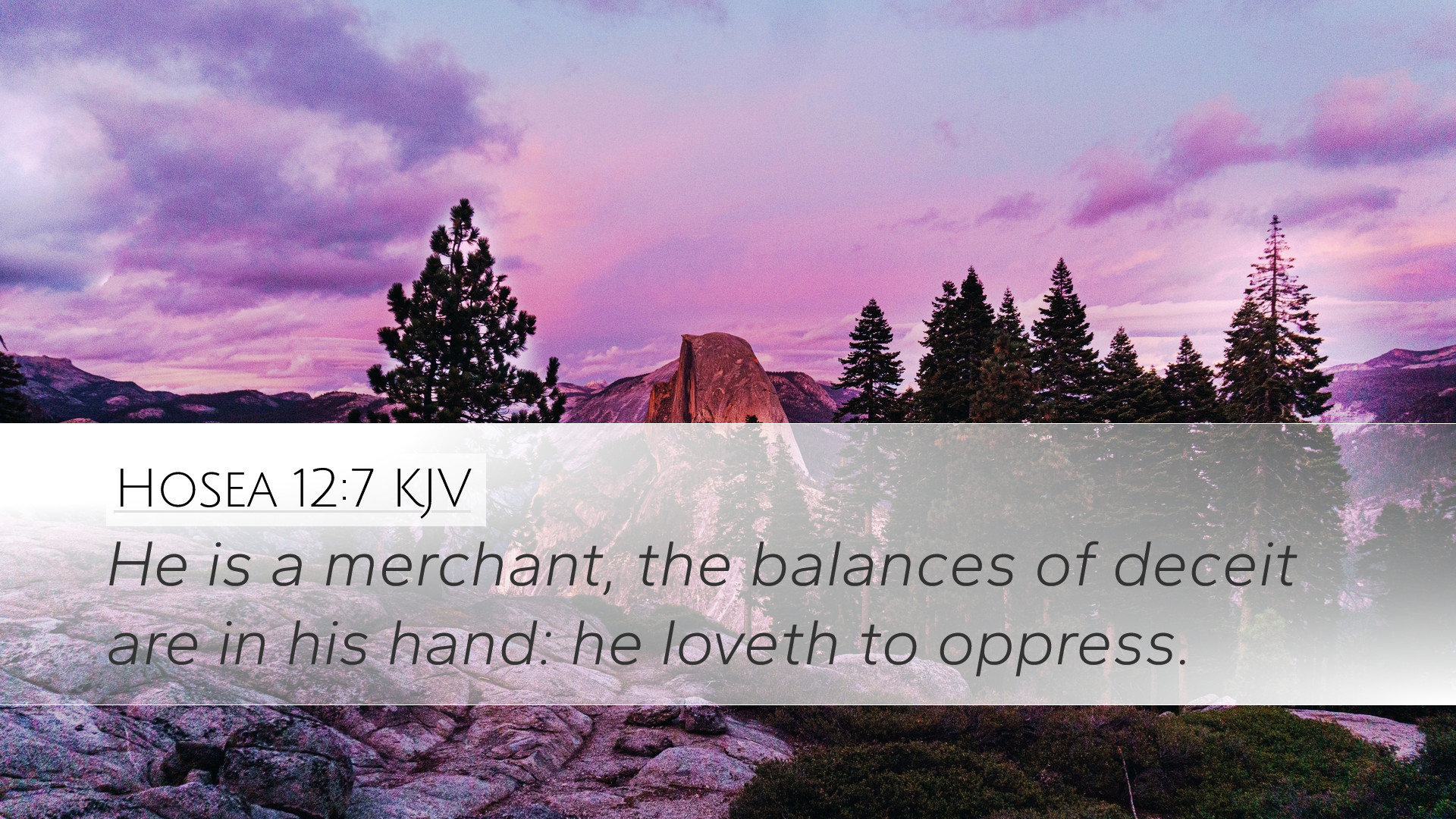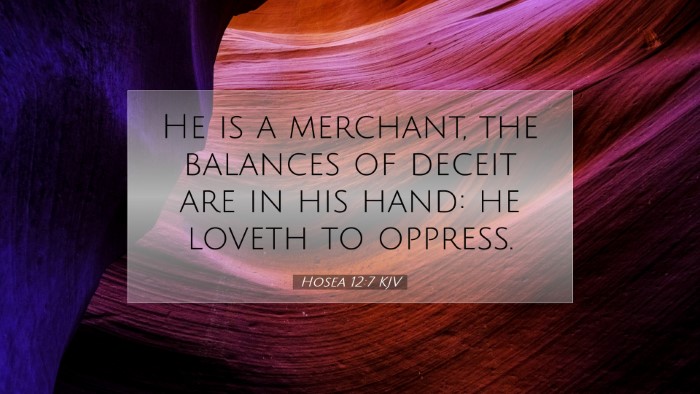Old Testament
Genesis Exodus Leviticus Numbers Deuteronomy Joshua Judges Ruth 1 Samuel 2 Samuel 1 Kings 2 Kings 1 Chronicles 2 Chronicles Ezra Nehemiah Esther Job Psalms Proverbs Ecclesiastes Song of Solomon Isaiah Jeremiah Lamentations Ezekiel Daniel Hosea Joel Amos Obadiah Jonah Micah Nahum Habakkuk Zephaniah Haggai Zechariah MalachiHosea 12:7
Hosea 12:7 KJV
He is a merchant, the balances of deceit are in his hand: he loveth to oppress.
Hosea 12:7 Bible Commentary
Commentary on Hosea 12:7
Verse Text: "He is a merchant, the balances of deceit are in his hand: he loveth to oppress."
Introduction
This verse from the book of Hosea highlights the moral and spiritual condition of Israel during the prophet's time. Here, God speaks through Hosea to critique the nation's ethical behavior, particularly focusing on the themes of deceit and oppression that characterize its societal interactions. Public domain commentaries provide profound insights into this passage, blending historical context, theological reflection, and applicable lessons for contemporary readers—particularly for pastors, students, and scholars.
Historical Context
Hosea prophesied during a time when Israel was experiencing political instability and moral decline. The nation was steeped in idolatry and disobedience to God, which was manifesting in social injustices. The reference to a "merchant" in Hosea 12:7 speaks to the economic practices of the people, who were engaged in dishonest trade, typified by the "balances of deceit."
Analysis of the Text
The Merchant
Matthew Henry notes that the term "merchant" indicates a pursuit of wealth, which in itself is not inherently sinful; however, it becomes problematic when it leads to unethical practices. The merchant in this verse symbolizes those who prioritize profit above honesty, reflecting a broader societal trend. Israel's leadership and merchants were criticized for corrupt practices that betrayed their covenant relationship with God.
The Balances of Deceit
Albert Barnes elaborates on the phrase "the balances of deceit." He argues that such balances were rigged to favor the merchant, allowing him to cheat customers and gain unfair advantage. This metaphor underscores the deceitful practices rampant in Israel, where social ethics were compromised for personal gain. Such corruption not only harmed individuals but also eroded the nation's integrity.
A Love for Oppression
Adam Clarke emphasizes the phrase "he loveth to oppress," interpreting it as indicative of a broader cultural apathy towards injustice. This love for oppression reflects an intentional choice to engage in practices that harm the vulnerable for profit. Clarke points out that this behavior aligns with humanity's fallen nature and is a significant concern for God’s covenant people.
Theological Implications
The elements of deception and oppression found in this verse provide a lens through which to view God's justice and mercy. God, as presented through Hosea, is deeply concerned with justice and righteousness within society. The call to hold to ethical standards is woven throughout scripture, and Israel's failure in this respect serves as a warning.
God's Judgment
The consequences of such deceitful practices are tangible—God warns that judgment will come upon those who exploit others. Hosea's message serves as a reminder that societal sins cannot be overlooked or justified simply because they yield monetary gain. Pastors and theologians can draw on this theme to underscore the importance of ethical standards in both personal and economic spheres.
Restoration and Hope
While Hosea's message is one of condemnation, it also carries the seeds of hope. In the broader context of the book, God’s desire is for restoration. The call for repentance and returning to righteous living remains constant. The faithful remnant is continually urged to uphold justice, making a case for the transformative power of repentance and the possibility of renewal.
Application for Today
This verse and its implications transcend time, offering valuable lessons for contemporary readers. The challenges of dishonesty and oppression remain prevalent in modern society. Understanding the historical context and theological implications can guide pastors and students in addressing ethical dilemmas within their communities.
Ethical Living
- Integrity in Business: Individuals are called to evaluate their business practices and ensure they adhere to ethical standards, serving as stewards of God's resources.
- Advocacy for Justice: Believers are encouraged to stand against social injustices, reflecting God's concern for the marginalized and vulnerable.
- Personal Reflection: Each person is invited to examine their hearts in relation to the sins of commission and omission, seeking personal transformation.
Conclusion
Hosea 12:7 serves as both a warning and a call to action. The critique of Israel's societal decay through the imagery of a deceitful merchant resonates on multiple levels, challenging each reader to reflect on their actions and the collective moral fabric of their communities. The insights from public domain commentaries enrich our understanding, equipping pastors, students, and scholars to engage deeply with the text and its implications for living righteously in today's world.


